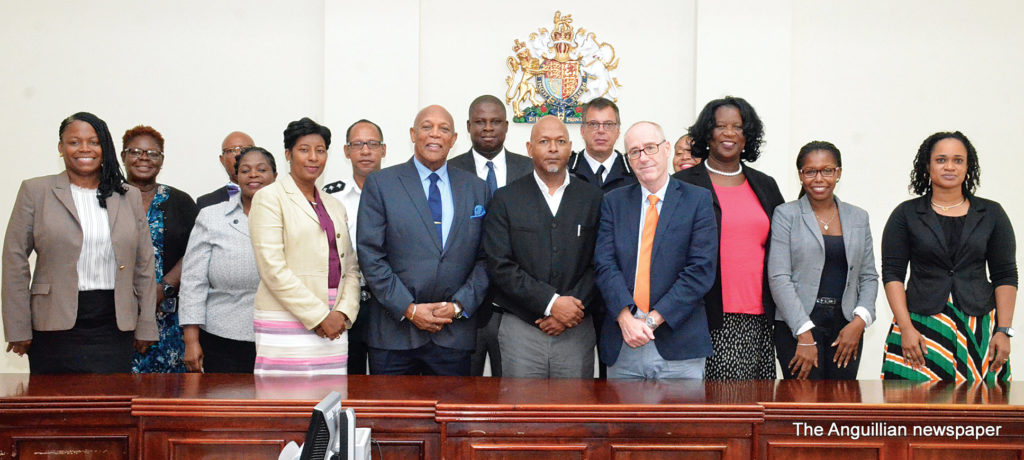
The Eastern Caribbean Supreme Court has launched a number of Sentencing Guidelines with respect to convicted persons in Anguilla and the other eight States and Territories in the jurisdiction. The first five guidelines have already been published on the Court’s website and the stage is set for the drafting and introduction of ten other guidelines later on. It is of interest for the public in Anguilla, and the other territories, to know what those guidelines are.
The guidelines were launched in Antigua on Tuesday, September 17, and transmitted to the other jurisdictions of the Court via simulcast. Several officials of the Governor’s Office and the Government of Anguilla, members of the Judiciary, and the Anguilla Bar Association, were at the High Court in Anguilla for the launch.
In delivering the feature address, Chief Justice, Dame Janice Pereira, said in part: “It is our hope that the approach, which has been adopted, will make the task of sentencing easier for Judicial officers. But, more importantly, that the approach taken will lead to the production of well-reasoned sentencing remarks, judgments or decisions by Judicial officers which can easily be understood by offenders, victims and members of the public in general.”
She continued: “It is also our hope that in time those sentencing remarks will build up a bank of sentencing jurisprudence which can be used by practitioners, students of the law and others…All of these measures will in turn go a long way towards building and maintaining public confidence in the administration of criminal justice. I also wish to emphasise that, as with any rule or practice, direction or guideline, they [the guidelines] will be monitored for fairness and effectiveness and where necessary, over time, will be subject to review and revision.”
The Chief Justice was grateful to her legal and executive team at the Court’s Headquarters in St. Lucia, and all the Judicial officers in the nine States and Territories, for their assistance with the training, organisation and coordination of the Court’s Sentencing Guidelines.
The Sentencing Guidelines were explained by the Hon. Iain Morley, Co-Chairman of the Eastern Caribbean Supreme Court Sentencing Advisory Committee. “We have [introduced] the rules today and the practice directions with five Sentencing Guidelines on drugs, theft, robbery, rape, unlawful sexual intercourse and aggravated sexual intercourse,” he told the Supreme Court and its various jurisdictions. “We have built the boat and it is afloat and slowly sailing now. Yet, as we are under sail, there is further work to do.

“The Sentencing Guidelines will be under constant review and adaptation and, for Easter, we hope to have added up to ten further sentencing guidelines on murder, attempted murder, manslaughter, grievous bodily harm with intent and without intent, actual bodily harm, burglary, fraud, corruption, incest , indecent assault and serious indecent assault.
“As the Registrar has already explained, it is the aim of the Sentencing Guidelines to bring greater uniformity to sentencing approach throughout the Eastern Caribbean Supreme Court. It is an approach already well-known in my Court and also where I sit in Montserrat. It will now travel throughout all nine of the States and Territories within the jurisdiction of the Supreme Court.”
Justice Morley added: “It is hoped that the public and defendants will better understand how sentences are constructed. This is a good day for criminal justice in the Eastern Caribbean. It is a day of progress where we here are helping to show the way to other jurisdictions – and have placed ourselves in a leading position.”
Other speakers of the Eastern Caribbean Supreme Court during the simulcast were: the Master of Ceremonies, Mrs. Michelle John-Theobalds, Chief Registrar; Mr. Dwaymian Brissette, Information & Communications Manager; the Hon. Gertel Thom, Justice of Appeal and Co-Chairperson of the Sentencing Advisory Committee; Mr. Thaddeus Antoine, President of the OECS Bar Association; Ms. Sirah Abraham, Criminal Justice Adviser to Barbados and the Eastern Caribbean who presented the Published Sentencing Guidelines to the Chief Justice; and Mr. Kenneth O’Marde, Deputy Registrar of the Antigua and Barbuda High Court.
The Sentencing Guidelines Project was funded by the Governments of the United States of America and the United Kingdom.








